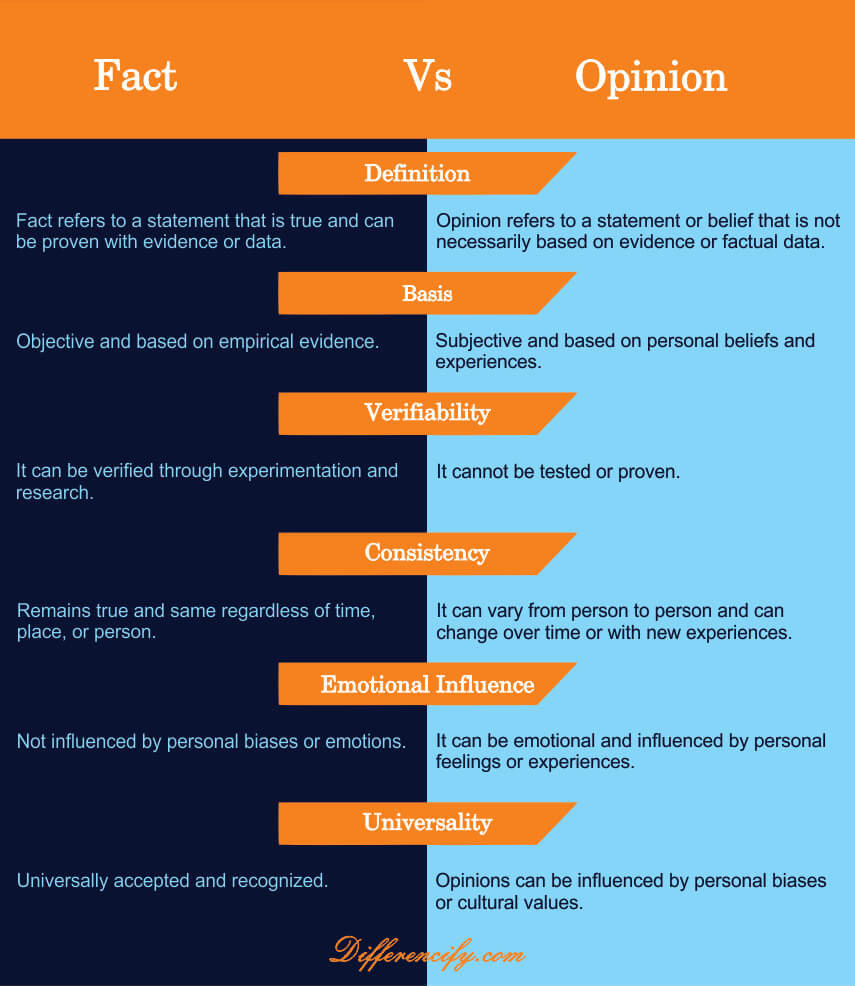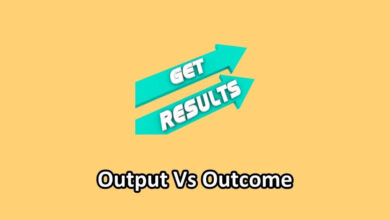In our daily lives, we encounter many statements, claims, and beliefs that people hold to be true. Some of these claims are verifiable while others are subjective. In the field of communication, understanding the difference between fact and opinion is crucial. This article aims to differentiate fact and opinion, and explore the key characteristics and differences between them. So let’s have a look at a table that compares both fact vs opinion in a very brief and sequential manner.
Fact Vs Opinion (Table)
| Facts | Opinion |
|---|---|
| Fact refers to a statement that is true and can be proven with evidence or data. | The opinion refers to a statement or belief that is not necessarily based on evidence or factual data. |
| Fact is objective and based on empirical evidence. | The opinion is subjective and based on personal beliefs or experiences. |
| Facts can be verified through experimentation or research. | Opinions cannot be tested or proven. |
| It remains true regardless of time, place, or person. | It can vary from person to person and can change over time or with new experiences. |
| It is an objective reality. | The opinion is a subjective statement. |
| Facts are not influenced by personal biases or emotions. | Opinions can be emotional and influenced by personal feelings or experiences. |
| Fact is universally accepted and recognized. | Opinions can be influenced by personal biases or cultural values. |
What is Fact?
A fact is a statement that is true and can be proven with evidence or data. It is objective and does not depend on personal beliefs or feelings. Facts are verifiable and can be tested through experimentation or research. For example, the earth is round, water freezes at 0 degrees Celsius, and the sun rises in the east and sets in the west are all factual statements.
Four Characteristics of Fact
The four major characteristics of facts are as follows.
- Objectivity: Facts are objective and do not depend on personal beliefs or opinions. They are based on empirical evidence and can be verified through experimentation or observation.
- Verifiability: Facts can be verified and tested through experimentation or research. They can be confirmed or refuted through evidence and data.
- Consistency: Facts remain true regardless of time, place, or person. They are universal and do not change based on personal beliefs or opinions.
- Universality: Facts are universally accepted and recognized. They are not dependent on cultural or personal biases and can be accepted by anyone, anywhere in the world.
What is Opinion?
An opinion is a statement or belief that is not necessarily based on evidence or facts. It is subjective and is based on personal beliefs, feelings, or experiences. Opinions can vary from person to person and can be influenced by personal biases or cultural values. For example, “chocolate ice cream is better than vanilla” is an opinion.
Four Characteristics of Opinion
The four most common characteristics of opinions are:
- Subjectivity: Opinions are subjective and depend on personal beliefs or experiences. They are not based on empirical evidence or facts.
- Variability: Opinions can vary from person to person and can be influenced by personal biases or cultural values. They can change over time or with new experiences.
- Emotional: Opinions can be emotional and may be influenced by personal feelings or experiences. They can be based on personal preferences or biases.
- Non-Verifiable: Opinions cannot be verified or tested through experimentation or research. They are based on personal beliefs or experiences that cannot be proven or disproven.
Key Differences between Fact and Opinion
While comparing fact vs opinion, here we have included some of the key differences between fact and opinion. They are as follows.
- Meaning: A fact is a statement that is true and can be proven with evidence or data. On the other hand, an opinion is a statement or belief that is not necessarily based on evidence or facts.
- Objectivity vs. Subjectivity: Facts are objective and based on empirical evidence, while opinions are subjective and based on personal beliefs or experiences.
- Verifiability vs. Non-Verifiability: Facts can be verified through experimentation or research. On the other hand, opinions cannot be tested or proven.
- Consistency vs. Variability: Facts remain true regardless of time, place, or person. In contrast, opinions can vary from person to person and can change over time or with new experiences.
- Emotional vs. Non-Emotional: Opinions can be emotional and influenced by personal feelings or experiences, while facts are not influenced by personal biases or emotions.
- Universality vs. Cultural Bias: Facts are universally accepted and recognized, while opinions can be influenced by personal biases or cultural values.
The following table also shows and compares fact vs opinion in a side-by-side manner.

Understanding Fact and Opinion By Example
To illustrate the difference between fact and opinion, let’s take the example of climate change. The statement “The earth is getting warmer” is a fact. It is supported by scientific evidence and can be verified through data and research. On the other hand, the statement “Climate change is caused by human activity” is an opinion. While there is scientific evidence to support this claim, it is not universally accepted and can be influenced by personal beliefs or values.
Conclusion
Understanding the difference between fact and opinion is essential in communication, critical thinking, and decision-making. While facts are objective and based on evidence, opinions are subjective and based on personal beliefs or experiences. It is important to recognize the distinction between the two and to use critical thinking skills to evaluate statements and claims. By doing so, we can make informed decisions and avoid being influenced by personal biases or false information.




One Comment